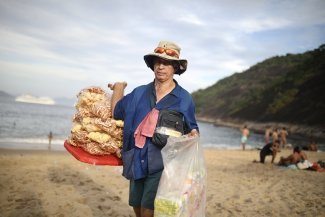President Donald Trump’s decision in January to suspend US$65 million to the United Nations Relief and Works Agency for Palestine Refugees in the Near East (UNRWA) sparked serious concern among Palestinians and their supporters over how this would affect the welfare of refugees.
The amount represents half of the United States’ funding to the agency, which has provided crucial services to Palestinian refugees in the occupied Palestinian territories and neighbouring countries since 1949.
However, the ongoing crisis is nothing new for UNRWA. During its 68-year history, it has almost constantly faced uncertainty over its fate and that of the five million Palestinians currently registered with the organisation.
The agency, initially intended to serve as a temporary relief effort, has now morphed into a quasi-governmental entity that represents, for better or worse, the only remaining element of crucial UN resolutions regarding the Israeli-Palestinian conflict still operational today.
For Jalal al-Husseini, a researcher with the French Institute of the Near-East (IFPO) in Jordan who has long studied UNRWA, the agency’s role was ambiguous from the get-go.
In December 1948, the UN General Assembly passed Resolution 194, which called for the return of Palestinian refugees expelled from their homes during the creation of the state of Israel and the provision of humanitarian services to these refugees until the newly-founded United Nations Conciliation Commission for Palestine (UNCCP) facilitated a peace agreement. UNRWA itself only came into existence following UN Resolution 302 a year later.
“UNRWA was created to assimilate refugees into their host countries, and not to perpetually serve them – on the contrary,” al-Husseini tells Equal Times.
UNRWA was initially designed to be operational for only a year, but Arab states – which hosted the majority of displaced Palestinians and did not wish to manage such a burden alone – pushed for an amendment to Resolution 302 making UNRWA’s mandate renewable; a process still implemented every two to three years.
Arab states also pushed for an amendment calling UNRWA and UNCCP to work together to implement Resolution 194, al-Husseini says. However, while still officially existent, UNCCP stopped working in the mid-1950s, and the UN has arguably abdicated its role as a peace broker in the Israeli-Palestinian conflict ever since.
As a result, “UNRWA is the only one of the three items in Resolution 194 which is still operational,” argues Salman Abu Sitta, a Palestinian researcher and the president of the Palestine Land Society, highlighting the agency’s unique case.
“Unlike UNHCR, which is concerned with refugees who leave their country and don’t want to go back, the Palestinian refugees are the opposite – they want to go back and they are prevented from going back,” he says.
UNRWA’s longevity against all expectations, as the refugee population under its care expanded from 750,000 to five million, has turned its humanitarian health, educational, and infrastructural services into a state within states. Its role is all the more crucial as refugees are barred from accessing public services in some host countries like Lebanon.
“UNRWA is a real local administration, temporary, weakly structured, with a weak financial base…but with 70 per cent of its budget going to the salaries of teachers, doctors, etc.,” claims al-Husseini. “For an international humanitarian relief agency, this is inconceivable.”
The high salaries of international employees, though they represent a small proportion of UNRWA’s total staff, has long been a source of criticism, in addition to what al-Husseini describes as a “top-down approach” towards refugees.
A humanitarian and political role
UNRWA has long been a staple of Mohammad Abu Srour’s life. For the 27-year-old Palestinian refugee who has lived his entire life in the Aida refugee camp, in the southern occupied West Bank, UNRWA provided education until the ninth grade, funded infrastructure in the camp, partially covered health care costs, and gave jobs to people in his community.
The reach of UNRWA services has gradually declined since the 1970s, although the organisation still provides education to half a million Palestinian children and health services to 3.1 million refugees.
However, Abu Srour, like many other refugees, believes that UNRWA’s most important role hasn’t been the distribution of services. Rather, it has been the role of the agency as a documentarian of the refugees themselves, due to its well-kept records of refugees from the Nakba (the 1948 Palestinian exodus) and their descendants.
“UNRWA gives proof that we are still refugees,” he tells Equal Times.
According to al-Husseini, many Palestinian refugees who were not in need of humanitarian assistance nonetheless registered with UNRWA in the 1950s specifically as a “proof of identity.”
“In the beginning, there were a lot of [refugee] demonstrations and riots against UNRWA’s integration efforts. UNRWA was a symbol of evil, it was an instrument of the United States and Israel to relocate Palestinians and make them forget their right of return. But since, UNRWA has really inserted itself in Palestinian society.”
“The body of the crime of ethnic cleansing is only visible today through UNRWA,” Abu Sitta says. “This record emphasises the origins of the refugees, and that kills the Israelis because they thought maybe younger Palestinians would not know where they came from and who they are.”
Fear-mongering to stay afloat
Due to its record-keeping efforts of the refugee crisis for nearly 70 years, UNRWA has long been in Israel’s crosshairs.
“We’re criticised by Israel for perpetuating the refugee crisis, which of course is complete nonsense,” UNRWA spokesman Chris Gunness tells Equal Times. “What perpetuates the refugee crisis is the failure of political parties to resolve this in the context of political talks based on international law and UN resolutions.”
Al-Husseini nonetheless believes that the Israeli position vis-à-vis UNRWA is “a little more nuanced,” noting that UNRWA’s existence has shielded Israel from its responsibilities towards refugees, especially those in the occupied Palestinian territory.
“Of course, they are against the idea of UNRWA as a political symbol, and as a symbol of the survival of the refugee issue,” he says. “But it has served Israel for many years before the creation of the Palestinian Authority. Israel has taken advantage of UNRWA’s donations and work. They know UNRWA is important.”
As a long-time supporter of Israel, the significant financial contributions from the United States to UNRWA since its inception might seem paradoxical. But for Abu Sitta, American monetary support to the organisation falls in line with US policies.
“The motive of the United States was not a gift or charity for Palestinians, it was only to save Israel,” he says. “The United States wanted to protect Israel from the instability and the agitation resulting from a whole population being prevented from returning to their homes. Paying was a way to pacify the refugees.”
Faced with recurring budgetary crises, UNRWA has come to adopt scare tactics to convince donor states – particularly in the West – to contribute further.
“Donors’ arguments have the upper hand. They are the ones who direct UNRWA with their contributions,” al-Husseini says. “UNRWA is perhaps the agency that has best learned how to utilise security to force contributors to pay the minimum.”
Discussing the latest funding shortage, Gunness’ arguments bore similar dog-whistle connotations.
“We hope donors will give generously, because, make no mistake, nothing short of stability in the Middle East is at stake,” Gunness says. “At a time when extremist groups are in recruitment mode, it’s surely not in anyone’s interest to have half a million children not in UN schools but on the streets. We feed 1.7 million food-insecure refugees, a million of those in Gaza. Is it really in anyone’s interest to have one million hungry, angry people in Gaza?”
Such rhetoric is not well received by refugees.
“It’s really offensive to us,” says Abu Srour. “UNRWA should be seeking money based on respect, morality, humanity, and human rights...you cannot threaten people saying that other people will become terrorists to achieve your goals. It’s a cheap way to do that.
“Today, we don’t get that many services from UNRWA, but this hasn’t turned us into extremists,” he adds. “This discourse also supports Israel’s justification of the occupation by saying that Palestinians are extremists and radical people, which is incorrect.”
Finding solutions
The recurring budgetary problems since the 1970s have left UNRWA in a perpetual quest for funds, as Gunness indicates that the organisation was already US$150 million in deficit prior to Trump’s announcement. As of early February, the organisation’s deficit stood at $290 million – although some countries such as Iceland and Belgium have since pledged to increase their donations to the agency.
“We’d much rather spend all of our time serving refugees and fulfilling our humanitarian mandate, but unfortunately the present situation dictates that we have to raise money,” Gunness says.
Different strategies have been evoked to address the issue. While Gunness stated that UNRWA was carrying out a campaign to raise US$500 million, UN Secretary-General Antonio Guterres announced in 2017 the creation of funds at the World Bank and the Islamic Development Bank to create more stable sources of revenue.
Meanwhile, some refugees – including the Refugee Youth Movement of which Abu Srour is a member – have held demonstrations since January to call on Arab League member states to present a request to the UN General Assembly for UNRWA to be funded through mandatory contributions.
“If we go to the root of the problem, the tensions are with the United Nations in general,” he says. “UNRWA should get a specific budget every year like other organisations; it shouldn’t be based on voluntary donations by different countries.”
While popular among refugees, al-Husseini says the latter option was unlikely to occur, as UN member states would presumptively balk at the idea.
However, changes such as scheduling contributions over five years, instead of every two years currently, could help bring more financial stability to UNRWA, on the condition of finding new stable donors.
“One could for example call on the members of the Arab League, as resolutions plan that Arab countries contribute at least seven percent to UNRWA’s funds,” al-Husseini says. “Now they are contributing two to three per cent, this is far less than they should.”
Ultimately, the only durable solution to UNRWA’s woes would be a proper solution to the Israeli-Palestinian conflict, 70 years on, Gunness believes.
“We want refugees’ plight to be resolved by the political parties in the context of a political agreement,” he says. “Then there would be no need for UNRWA.”
In the meantime, despite the hurdles faced by UNRWA, Palestinians have urged the organisation to address the flaws inherent to the agency.
“UNRWA is very important for us as Palestinians and we want to keep it, because it proves that we still exist as refugees until now,” Abu Srour says. “But they should change their own ideology.”
“UNRWA should start cooperating more with the people in Palestine and understand their needs…we are not hungry and thirsty, we are looking for our rights and our freedoms. Our dignity is more important than a bottle of olive oil or a kilo of rice.”









